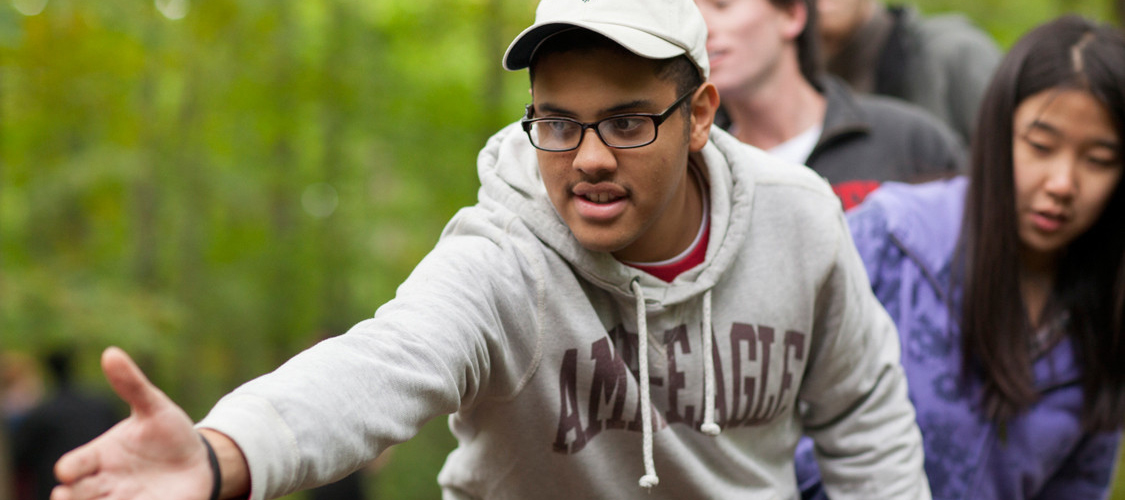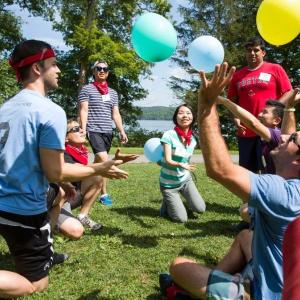Pre-Program Information
Participant Documents
All participants, regardless of program, are required to complete a Participant Waiver. If participants are under 18, a parent or guardian must also sign the waiver.
Getting There
Hoffman Challenge Course on Google Maps
We can also book programs at a location of your choice so make sure to confirm the location with your event coordinator!
Safety and Challenge By Choice
Cornell Team & Leadership Center has a stellar safety record. In addition to an excellent facility and well-trained instructors, we ask all participants to contribute to the safety of each program by making responsible decisions regarding their own level of participation. No more than average physical ability is required.
Most importantly, our ethic of challenge by choice means that every activity is an opportunity, and that at no time will any participant be obligated to do anything they do not wish to do.
Those with relevant medical concerns or emotional needs are encouraged to speak with facilitators and exercise good judgment regarding their participation.
Portable Team Initiatives
These are team-based challenges that encourage people to work together as they solve problems and complete tasks. Participants will be engaged by a series of unique exercises that may include passing objects, brisk walking, or balancing. These exercises are physically and mentally engaging, but not physically strenuous and are conducted in a supportive environment designed to invigorate and integrate your team.
Low Element Programs
The low element programs at the Hoffman Challenge Course engage teams in unique exercises on our low ropes course. These exercises require groups to brainstorm, plan, implement, evaluate, and improvise. These activities are conducted in a supportive environment designed to invigorate and integrate your team. The activities will be physical in the sense of requiring active participation, but they do not require above-average physical fitness. You may be walking on cables 2-feet above the ground, balancing on boards, passing objects, sitting on the grass, or even crawling under ropes.
High Ropes Climbing Elements
High elements can be team-oriented, individual, or small group challenges. These range from heights of 10 to 40 feet above-ground. They allow participants the opportunity to grow through personal challenges while being supported by their team. This is an opportunity to stretch one’s comfort zone, step beyond perceived limits, and “reach new heights” with the support of your peers. The centerpiece of the Hoffman Challenge Course facility is a 64-foot high replica of Cornell's McGraw Tower, complete with a "tree fort" platform, rappelling stations, and a 400-foot double Zipline. Other high elements include high Balance Beams, Pamper Poles, a Flying Squirrel, and many others.
There is a 300lbs weight limit on the zip line.
Virtual Program
The climbing components of these activities can be strenuous, but there are many important supporting roles that participants can assist with from the ground. Every participant will be wearing a waist harness and a helmet, so long shorts, non-baggy clothing and low hairstyles are suggested for maximum comfort.
Virtual programs take place on either Zoom, Google Meet or Microsoft Teams. The facilitators will run a variety of activities that include discussions, problem solving, collaboration and self reflection. There may be some light physical activity as well. You will move between a main virtual room and break out rooms where you may be asked to access documents or other websites in order to participate. We encourage you to keep your camera on during the entire program so that everyone can pick up on valuable body language from their teammates.
These exercises require the use of a personal computer with stable internet connection and audio/visual capabilities. You will need to have the selected virtual platform installed on your computer in order to join.
How to Dress for May-September Programs
The majority of our programs take place outdoors. You may be climbing up wooden structures, sitting on log benches or kneeling on grass. Wear clothing that protects your body from the sun and bugs.
- Closed-toe shoes are required - sneakers are ideal
- Wear flexible clothes that will allow you to climb and stretch
- Dress in layers and bring more layers than you think you will need
- Bring a rain jacket even on days that look bright and sunny
- If you decide to wear shorts, they should be at least mid-thigh length so that you are comfortable wearing a waist harness on the high elements.
- Long hair should be tied back and loose jewelry should not be worn as they can get in the way while climbing
How to Dress for Oct-April Programs
In the colder months we offer both outdoor and indoor programming. The list of suggested gear below is primarily for outdoor programs.
- Closed-toe shoes are required- Hiking shoes or a waterproof shoe (ankle support is not needed unless you are prone to twisted ankles, however there could be snow on the ground, so a snow boot would be a fine option as well)
- Warm beanie/hat
- Wool or synthetic “base layer” like long-johns or a long sleeve shirt
- Fleece jacket or sweater, puffy jacket or vest

- Jacket shell to protect you against the wind
- Gloves
- Lightweight, full-length hiking pants or heavier duty-pant that you can still stretch your legs in
- Wool socks (heavier socks are better)
Weather
- Check the hourly weather report before coming out for your program
- The temperature at our Challenge Course on Mount Pleasant is often a few degrees colder than the Ithaca campus.
- There are times when it’s a gorgeous day in downtown Ithaca, but up at the Challenge Course, it is windy and overcast (or more extreme) so be prepared for anything and bring layers!
Water, Snacks and What to Bring
- Reusable water bottles to keep yourselves well-hydrated (we have water available for refilling bottles)
- Bring snacks! (fruit, granola bars, etc.) You'd be surprised how much energy you expend doing team challenges and climbing! If your group is not providing meals, please bring something to eat so that you can fully engage with the program.
- Any personal medications that you’d want to have with you in the outdoors (inhaler, EPI-pen, etc. )
Yurt Rentals and Overnight Stays
On-Site Facilities
 natural light during the day, but as a result, it can heat up in the summertime. The "small yurt" is about 30 feet in diameter. It is located in the forest and it tends to stay a little cooler since it's in the shade. The yurts are large open spaces with a few screened windows and lanterns strung along the inner perimeter. They are unfurnished and very rustic.
natural light during the day, but as a result, it can heat up in the summertime. The "small yurt" is about 30 feet in diameter. It is located in the forest and it tends to stay a little cooler since it's in the shade. The yurts are large open spaces with a few screened windows and lanterns strung along the inner perimeter. They are unfurnished and very rustic.NEVER LEAVE FIRES UNATTENDED. Please return all firewood to the place that you found it after your staff. No firewood should be left in the yurt.
Parking: Please park your cars in the parking area near Moriah Hall (the bathrooms). You may drive up to the pavilion briefly to unload gear, but please do not drive on the grass and don’t leave cars in the field area.
Other Needs
Bugs, Ticks & Lyme Disease
Please remember that we are sharing the great outdoors with insects. From June to August we have mosquitos and black flies at the Challenge Course. There are spiders and ticks all year round. During any outdoor activity in the northeastern United States, there is the risk of getting bitten by a tick that carries Lyme Disease.
We have insect repellent available for your use at the course. Visit the NYS Department of Health Guidelines on Lyme Disease for more information.
If you have any questions please e-mail us at teambuilding@cornell.edu or call us at 607-254-4897.
Thank you and we look forward to meeting you!


